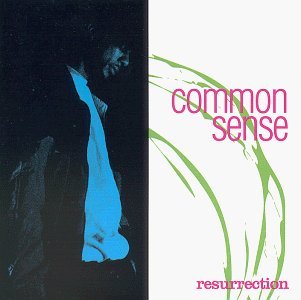Common Sense first caught my attention while sittin’ in the passenger seat of an Isuzu Rodeo, in the video of the “Soul By The Pound (Remix)”. At the time, I thought the witty pop culture references laced in those rhymes were funny, yet somewhat smart. I would later cop his “Can I borrow a dollar” LP and think the same of the lyrics on that joint. Much can be said about his first LP, and the fact that a great promise showed. However, it was only on his sophomore effort (far from sophomoric) where his aptitude was realized. If ever there was an album that epitomized the word ‘classic,’ it would undoubtedly be “Resurrection.” At first listen 10 years down the timeline, listening to it reminds me of “Low End Theory” in terms of absolute timelessness. Words of wisdom laced throughout it still ring true today, and the music sounds fresher than spring lettuce on March 21st.
The album opens up with the title track, and the scratches by Mista Sinista blend harmoniously with the jazzy melody. Common opens it up by spittin out how he is literally immersed in his music. All he does it to “bathe in basslines, rinse in riffs” and “dry in drums.” I’m embarrassed to call Track 2 an anthem, because that does not do it the justice it deserves. Boasting quite possibly the fattest beat ever constructed, “I Used to Love H.E.R.” is a metaphor of a lifetime long relationship between Common and a woman; aptly named hip-hop. Not only does this cut give us a history lesson into how hip-hop changed from where just “a few New York niggaz, had did her in the park,” to the glamour and glitz of Hype Williams-directed videos, it also conveys Common’s passion and reliance for the artform for self-expression: “I met this girl, when I was ten years old/ And what I loved most she had so much soul/ She was old school, when I was just a shorty/ Never knew throughout my life she would be there for me.” From this point on, Common displays his wit and creativity with the laid back groove, “Watermelon.” This is where he showcases the same lyrical charm from his first LP:
“I express like an interstate
Hyper when I ventilate
My rap pieces penetrate
and infiltrate your mental state
Just to reiterate
That I innovate..”
“Book of Life” follows and takes one on another headtrip. An autobiographical tale, Common relays his trials and tribulations over the years, and puts a few things in perspective. If you thought that this LP was gonna be full of hilarious punchlines and ill metaphors only, then you are in for a bit of surprise. What made this LP so resonating is that a jarring amount of realism breaks through some of the tracks. One line sums up the underlying message. “It itself life is an obstacle/ As I maneuver through the manure I try to be responsible.”
One minor drawback that this LP has, is the fact that track 5 is wasted! A wicked fuckin’ beat just plays out, without anyone spittin over it. For such a tight track, we would have at least hoped that someone woulda graced it with their lyrics. Imagine how disappointed you woulda been if Biggie never rapped over the “One More Chance” beat, and he just let it play through for a minute or so. Injustice. “In My Own World (Check the Method)” is done with fellow crewmate and producer, No ID. Here, he waxes lyrical about the economic hardships of MCing. Track 6 is a throwaway insert about a macking session gone wrong, and “Nuthin’ to Do” highlights the ‘ample’ ways to wile away the time in the South of Chi-Town. “Communism” epitomizes what Common Sense can do as an artist; combine extremely clever, insightful yet thought-provoking words over an intoxicatingly-hypnotic, jazzy beat:
“Com is on a mission
not to work for commission
It’s a common market and it’s so much competition
but to me, competition is none
To my comp I’m a ton
I get amped like Watts in a riot
my compact disc is a commodity, so buy it…”
The same can be said of “Orange Pineapple Juice” and “This is me.” The other track, “Chapter 13 (Rich Man vs. Poor Man)” is a collabo with Y-Not, and offers a humorous anecdote. “Maintainin” and “Sum shit I wrote” are yet more showcases of Common’s penmanship. His supreme lyrical ability is on display like Entemann’s doughnuts. Finally, the LP closes out with Lonnie Rashid Lynn’s father philosophizin’ about the current state of affairs. At the time, I found that a first amongst the image-driven hip hop. Common opened the door into his world, and was not afraid to say to the hip hop community, “I was born in Chicago raised on Planet Rock.” Despite all the thuggin going on at that time, Common refrained from hiding behind an image to sell records. He was an artist who just wanted to say that “I love my music, I love my momma.” And like what Chris Rock also said about cornbread, ‘aint nothing wrong wit dat.’

